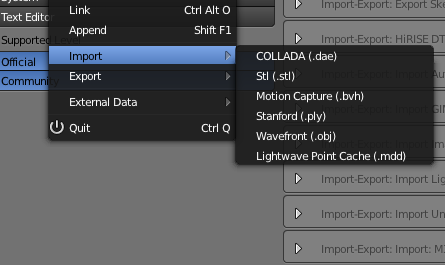
It’s a very ambitious project that does a lot of unique things, that may possibly even never been seen before. I will post in the SF.net forum very soon with a snapshot of the source code.
AUTODESK 2019 OPENCOLLADA CODE
Just FYI, I finished the last bit of code in the first draft of the COLLADA-DOM rewrite yesterday. That’s why I value C++ so, since you can use it to feel your way around “the labyrinth,” whereas C can’t help you there. I’m very focused on making working with COLLADA productive. Name wise they seem like a good fit don’t they? Anyway, Daedalus built the labyrinth. Daedalus may end up related to Khronos somehow.

It’s possible you could contribute your work to this effort. I thought afterward I could clean up the renderer side of the project, and then maybe parley that into the beginnings of Daedalus, or at least get the DOM library up on two feet. Dusting off COLLADA-DOM has been a major job. It combines rewrites of COLLADA-DOM and Open Asset Import Library (Assimp.) Presentation wise it’s like a COLLADA/XML browser. It’s focus is on art and art preservation. But what I am involved with needs support on the art side of things. PS: I’m working on an alternative to Blender that will be called Daedalus. Good luck, and please watch COLLADA-DOM over the coming year. If you can do anything good with C, you’ll require C++ wrappers, or only 1 out of 100 programmers will give it a look. There’s definitely a need for opensource-like quality implementations for COLLADA. Broken because the core-library was made to no longer compile against them. They are just part of the project, but part that had been broken for years on the SF.net hosted repository. The COLLADA-DOM library has a renderer and things, that I haven’t even looked at. It’s usually used for linear programming and other very shallow things that require transparency. I just don’t know how much of the world still cares about it. There is an art in writing exported APIs in C for binding purposes. Same for math, like implementing a vector or matrix library with C.

So it’s difficult to find your way around a big maze like schema. In the FUTURE I may interest in generate C parser for COLLADA XSD, not bad idea, but not for now. Since I’m parsing by exported order it must be work fine, I thinkĪFAIK OpenCOLLADA also generates C++ classes using COLLADA scheme but it seems very complicated to meĪlso I can use C++/C++11 very well but I like C more than C++. I solved this by separating camera to new node (make sure all cameras have unique node) and append new rotation element (during parsing) or rotate matrix directly (if only matrix exists). I cant use directly because camera needs be rotated to old -Z direction to get same view matrix.I cant rotate transform for camera because the transform is correct for geometry (because it is alreay converted to new coord sys).

If camera and geom exist in same node with same matrix then a big problem occours: My lib supports any coord sys including RH, so I’m converting all transforms (marices, rot, scale, trans…) after parsing node to new coord sys,Īll new model transforms converted correctly to new coord sys except camera orientation.Ĭamera in Z_UP looking toward -Z, but -Z is -Y in Y_UP so I must apply extra rotation for camera after converted transfroms to new coord sys, I’m writing this library in C99 which is almost finished parsing (except animation and MathML) and writing a viewer/renderer to validate my progress. If anyone has better idea I’d like to hear it The new node will lost previous id, sid and name this may cause some issues but node.camera = newnode.camera (pointer) probably will fix this This seems what I need and fixes my problem,

I’ll create a new node for camera with same matrix/transform and apply extra necessary rotation when parsingġ 0 0 0 0 -4.37114e-8 -1 -20 0 1 -4.37114e-8 0 0 0 0 1


 0 kommentar(er)
0 kommentar(er)
